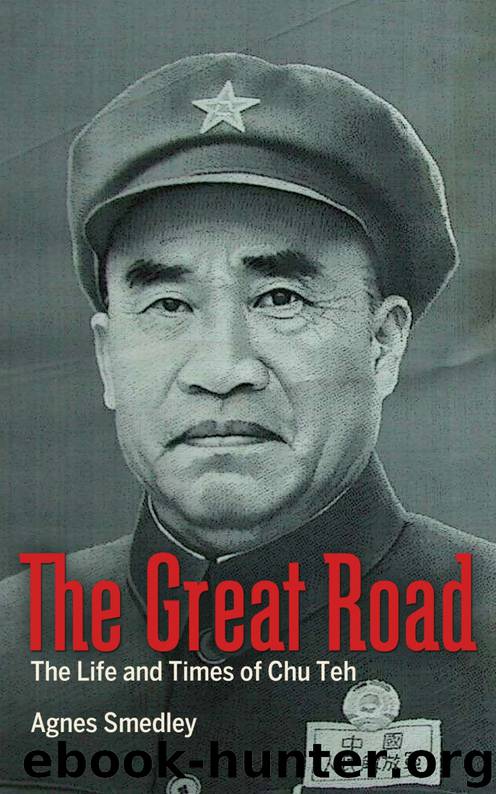The Great Road by Smedley Agnes;

Author:Smedley, Agnes;
Language: eng
Format: epub
Publisher: Barajima Books
Published: 2020-01-07T16:00:00+00:00
Chapter 20
IT WAS mid-December before all the scattered units of the revolutionary army had assembled and reached the Shaokwan area in northern Kwangtung Province, some two to three days’ march from Canton. By that time, the territory before them was swarming with Min Tuan and with “militarist troops.”
While probing for a way through the mountains, the army met a company of armed cadets from the Officers Training Regiment at Canton who rushed towards them with hoarse cries of joy. These cadets told them that the Canton uprising had taken place on December 11th and that they and their regiment had participated in it. The Canton Commune, established during the uprising, had been crushed three days later by the combined might of Kuomintang troops and British gunboats. There had been a grisly massacre of thousands of workers, peasants, students, and revolutionary soldiers. Small groups of men who had escaped were trying to make their way to Chu Teh’s army, as the company of cadets had done, to join it and continue the revolution.
General Chu Teh’s summary of the national situation at this moment in history was something like this:
The Canton Commune unleashed a new wave of counter-revolutionary terror against the mass movement throughout the country. Everywhere were small islands of revolutionary resistance. With the two hundred cadets who now joined it, the Workers and Peasants Revolutionary Army under Chu’s direct command totaled some seventeen hundred men. At Chaling to the northeast were the five hundred Hankow garrison troops and not far away from them at Chingkanshan were another thousand men commanded by Mao Tse-tung.
General Ho Lung was somewhere in northwest Hunan, again gathering a peasant army about him. Fang Chih-ming, the peasant leader, was leading the peasants in northeastern Kiangsi, while a small group of Whampoa Military Academy graduates were building a revolutionary base in the Tungku mountain area in central Kiangsi. Peng Pei was still leading the remnants of the Ironsides and the peasant partisans in the East River Region of Kwangtung.
The peasant revolt was already shaking Hunan, known as the domain of some of the most savage “tiger landlords” of China, landlords whom the peasants lumped together as “nobles.” In the darkness of each night desperate peasants were picking off Min Tuan sentries, arming themselves, and storming the manor houses of the “nobles” who in turn led their Min Tuan against sleeping villages where they seized and killed peasant leaders and mounted their heads on poles as a brutal warning. It was a merciless, savage struggle with no quarter given on either side, ragged peasants attacking and fighting and dying with curses on their lips.
The tragic dramas being enacted in hundreds of villages in south Hunan were no different from what this writer personally witnessed in later years when the landlords and their minions cast in their lot with the Japanese Imperial Army and fought the Communist guerrillas, most of them peasants, who operated against them.
Without food and shelter and carrying their wounded, the peasant rebels would enter a
Download
This site does not store any files on its server. We only index and link to content provided by other sites. Please contact the content providers to delete copyright contents if any and email us, we'll remove relevant links or contents immediately.
| Military | Political |
| Presidents & Heads of State | Religious |
| Rich & Famous | Royalty |
| Social Activists |
Waking Up in Heaven: A True Story of Brokenness, Heaven, and Life Again by McVea Crystal & Tresniowski Alex(37004)
Empire of the Sikhs by Patwant Singh(22173)
We're Going to Need More Wine by Gabrielle Union(18075)
Hans Sturm: A Soldier's Odyssey on the Eastern Front by Gordon Williamson(16646)
Leonardo da Vinci by Walter Isaacson(11906)
The Radium Girls by Kate Moore(10909)
Educated by Tara Westover(7065)
Tools of Titans by Timothy Ferriss(6950)
How to Be a Bawse: A Guide to Conquering Life by Lilly Singh(6694)
The Last Black Unicorn by Tiffany Haddish(5075)
Permanent Record by Edward Snowden(4999)
The Rise and Fall of Senator Joe McCarthy by James Cross Giblin(4847)
Promise Me, Dad by Joe Biden(4451)
The Wind in My Hair by Masih Alinejad(4425)
The Crown by Robert Lacey(4106)
A Higher Loyalty: Truth, Lies, and Leadership by James Comey(4034)
The Iron Duke by The Iron Duke(3640)
Joan of Arc by Mary Gordon(3260)
How to be Champion: My Autobiography by Sarah Millican(3188)
